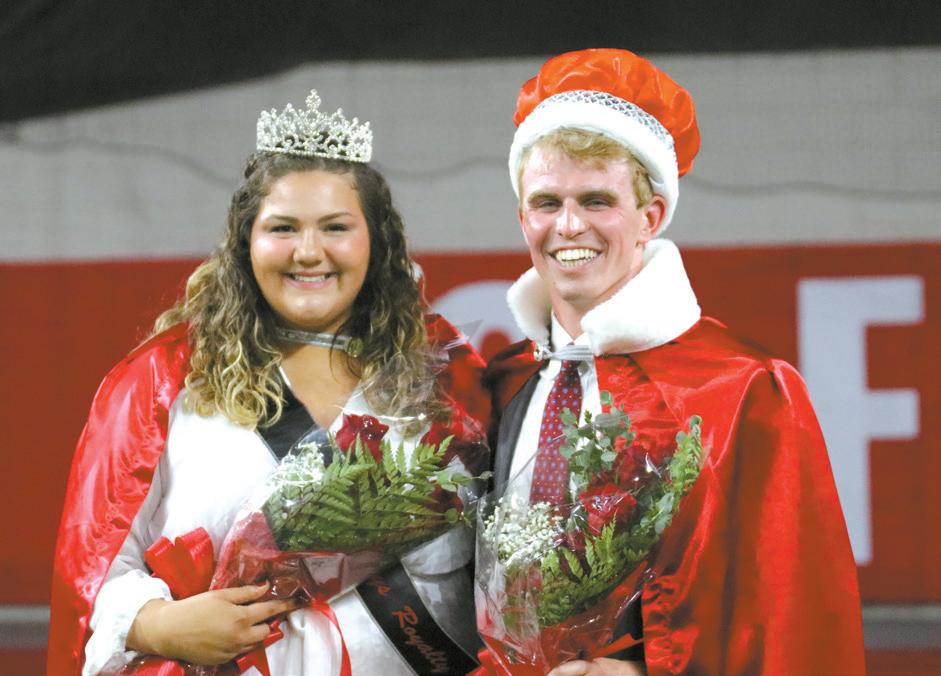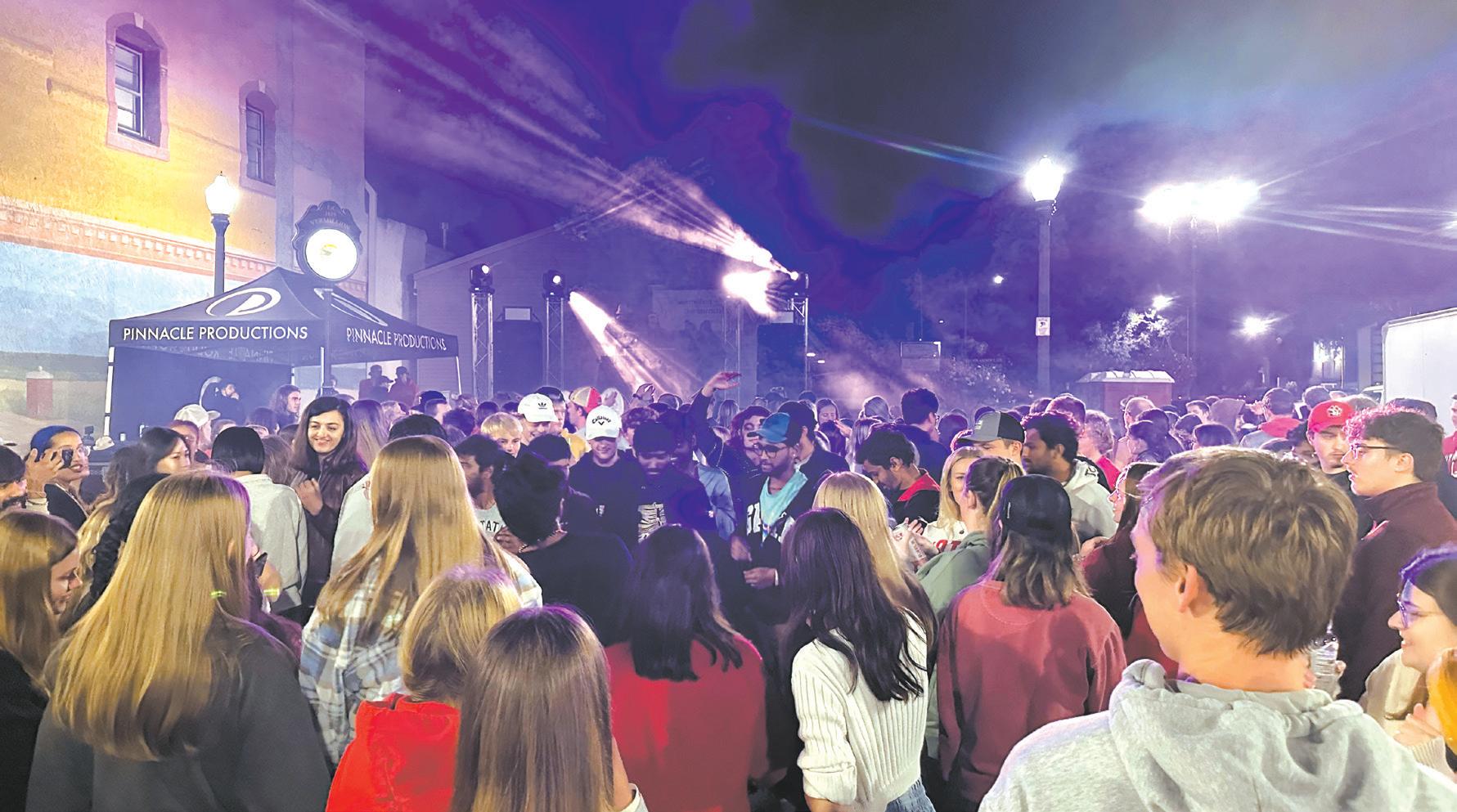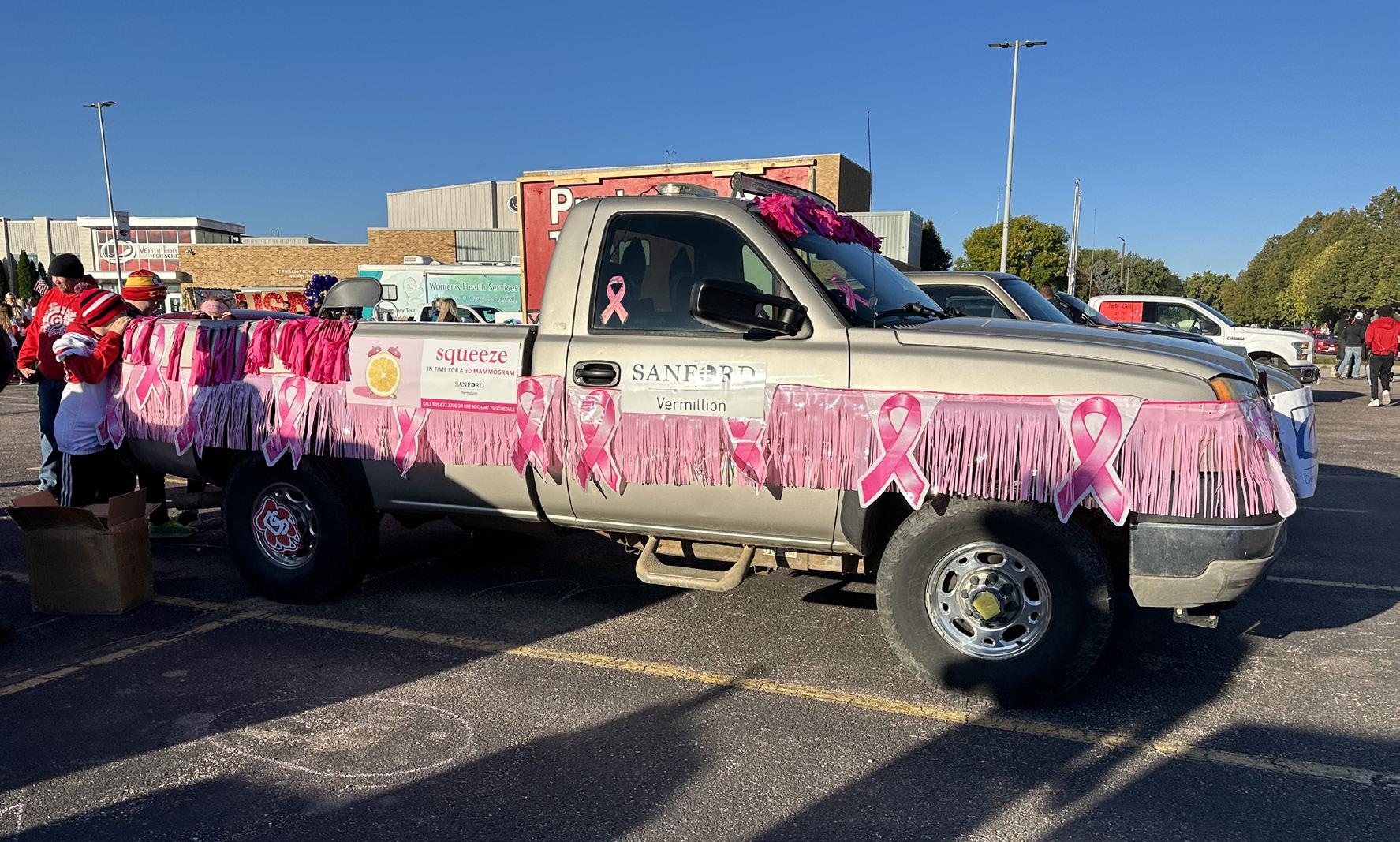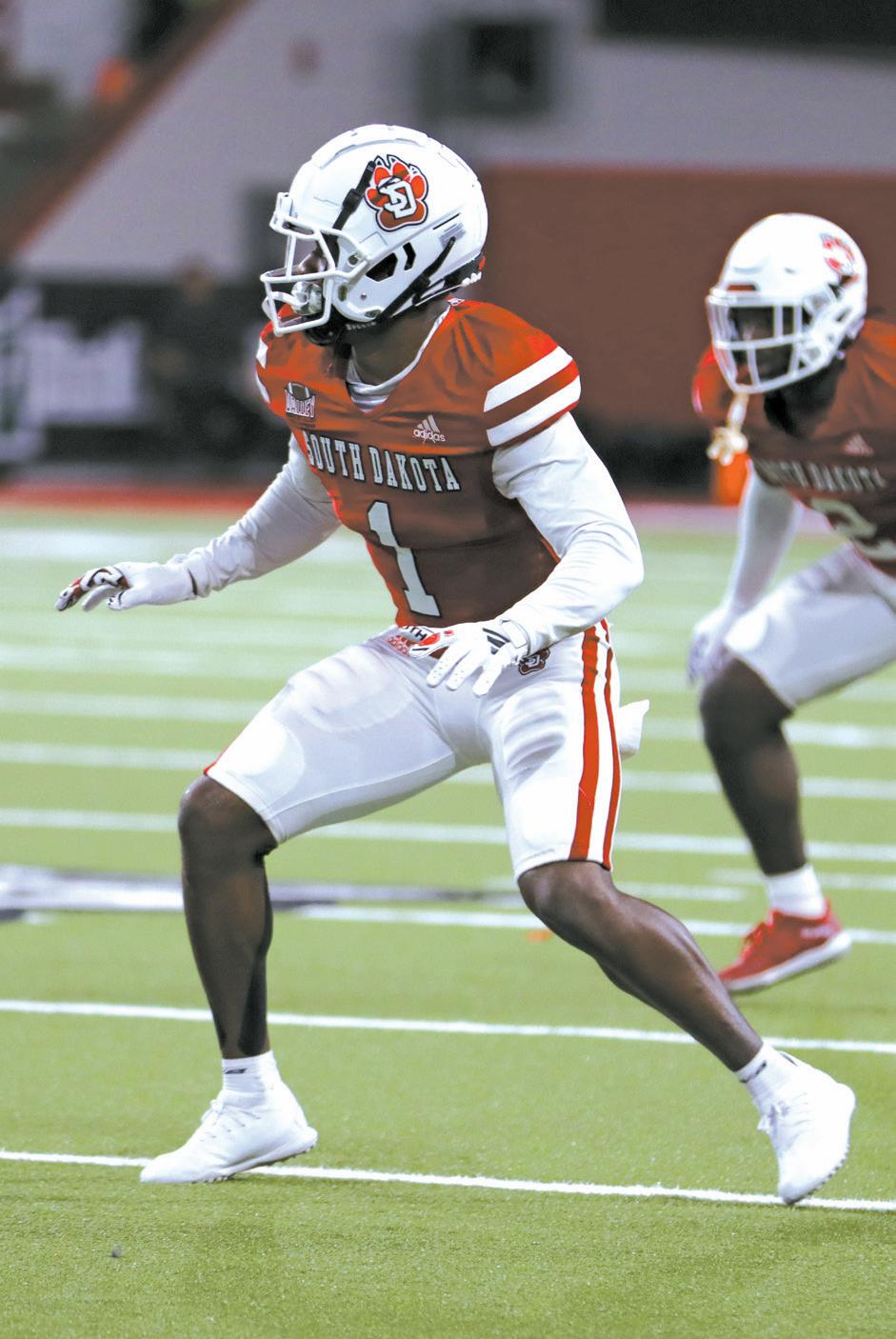USD
See more on Page 3
See more on Page 11
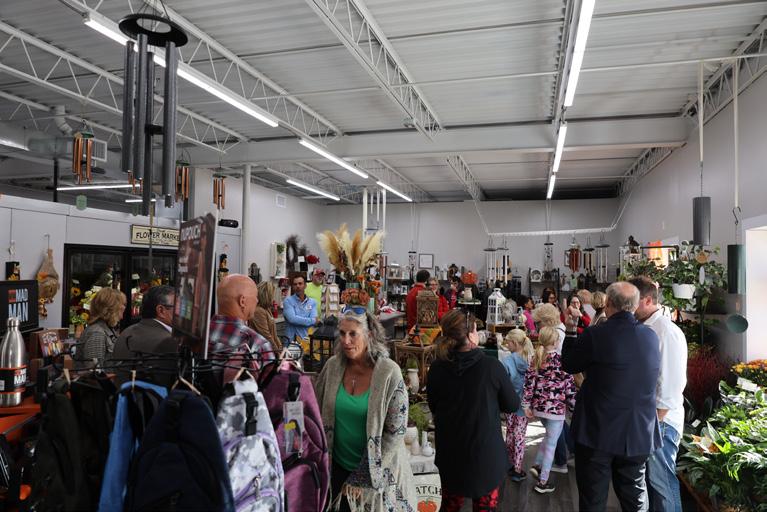

USD
See more on Page 3
See more on Page 11

After their victory against Murray State on Dakota Days, the Coyotes have jumped up five spots into the top 10 in FCS Stats Perform Poll. This is the highest the Coyotes have been ranked since 2017. See more on page 6.
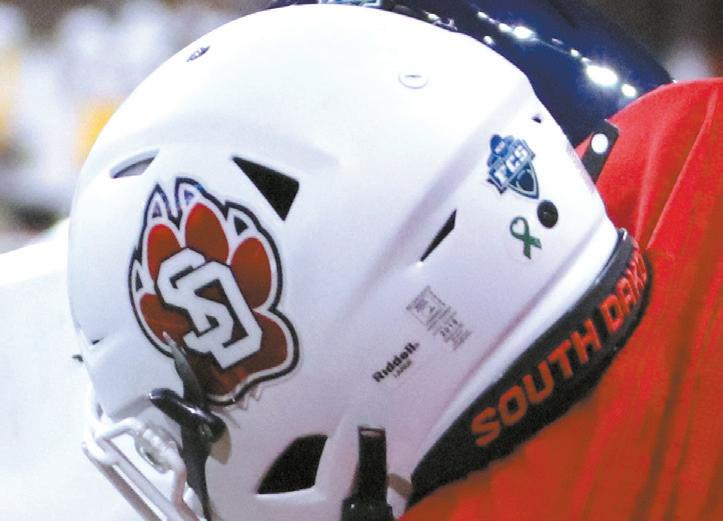
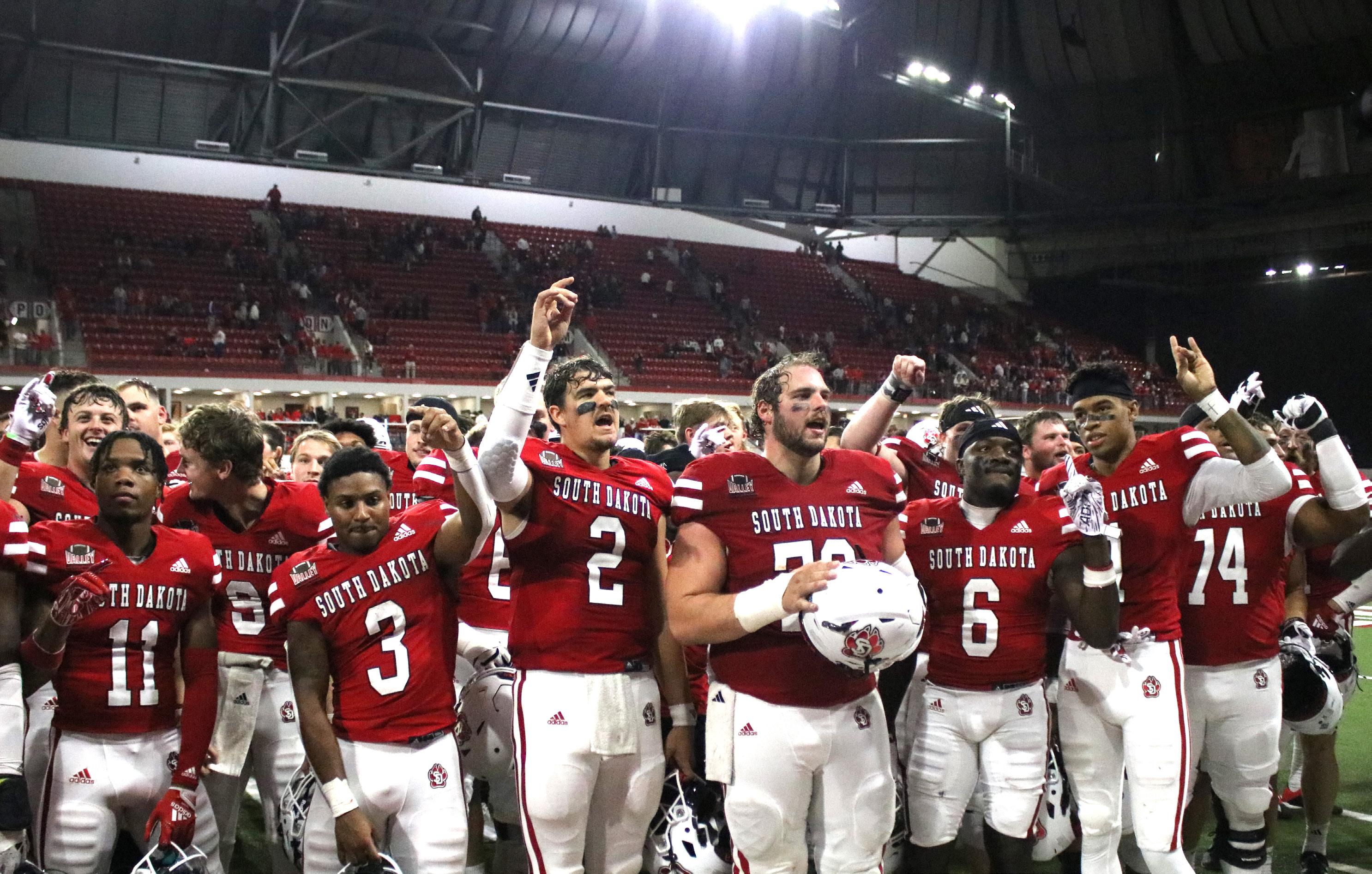
USD has reached a near record-breaking high of incoming student enrollment this fall at an overall increase of 5.5%.
This increase is only slightly higher than that of last year; however, it is the second largest main campus class in university history, right behind the No. 1 class enrollment of 2018.
USD-Sioux Falls saw an increase as well in student enrollment, with the number of overall students enrolled being 4.4% higher than previous years. This includes a 6.2% increase in all undergraduate admissions, making this year’s number of undergraduate students enrolled at USD-Sioux Falls the highest it has been since 2014.
Mark Petty, the Director of Strategic Enrollment Communications, said that the university also saw a significant increase in the amount of international students enrolled at USD.
“International enrollment extended its streak of record-breaking years for the third consecutive time,
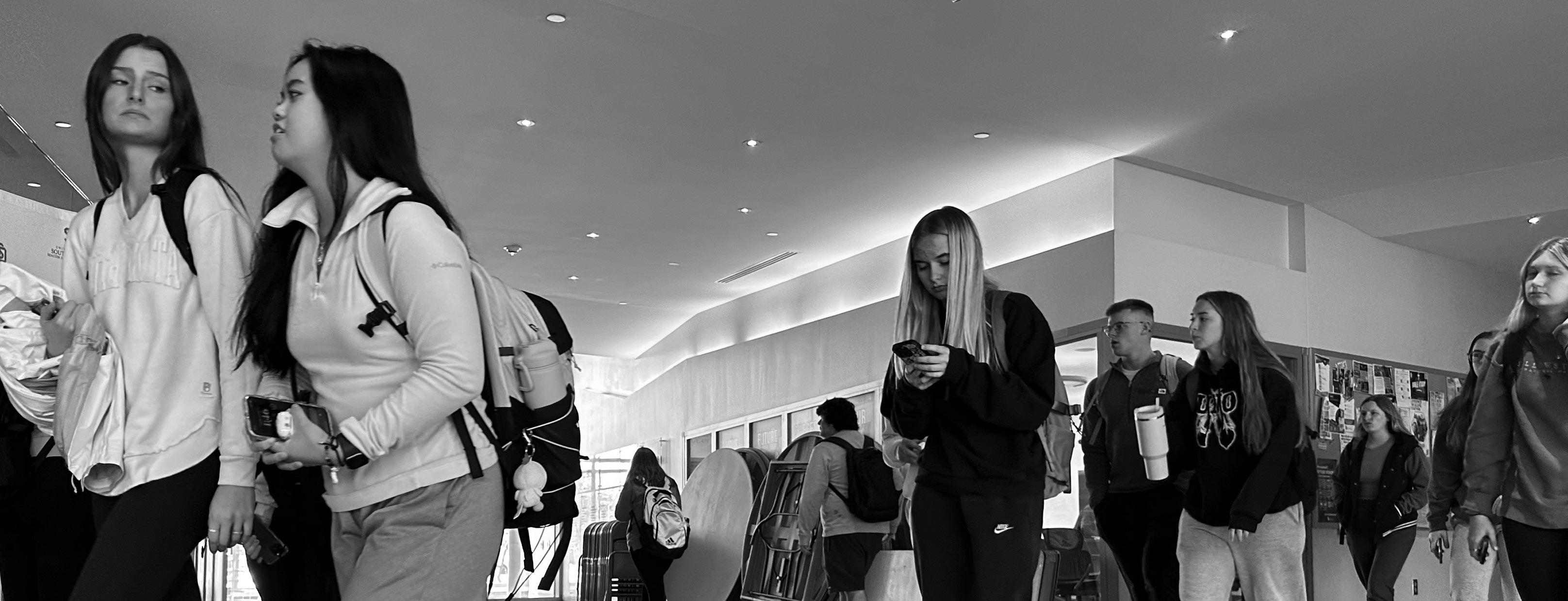
enrolling 606 total international students,” Petty said. “That is by far the largest number in university history and more than double the number of international students enrolled in 2021.”
USD also saw departmental enrollment increases including; 18% increase in Pre-Nursing, 31% increase in Pre-Dental Hygiene, 20% increase in new graduate computer science students, 18% increase in the Computer Science Department’s artificial intelligence program and 31% increase in Ph.D. Health Sciences enrollment.
Connor Peterson, the Director of Undergraduate Admissions, further went into detail about the incoming class who made up this year’s increased enrollment numbers.
“We saw significant increases in enrollment of students from Nebraska and South Dakota this year at 21.1% and 6.8% growth over the last year.”
Given the increase in student enrollment, USD campus housing had to make some adjustments regarding on campus living, including a delay in the timing of some on campus renovations and university housing offering some returning students the
opportunity to live off campus to ensure room for all incoming students.
“We know that each student that enrolls will have an impact on our campus, so each class, regardless of its size, is important to the future success of USD,” Peterson said. “As we continue to innovate and improve enrollment strategies, strengthen campus partnerships and highlight our students and their successes, inevitably the positive outcomes at USD will continue.”
Petty agreed with Peterson’s statement as he said he feels as though the increase in enrollment contributes to the vibrancy of life on campus.
Peterson went on to explain that she feels as though this year’s enrollment numbers are a direct correlation to the diligence of USD admissions offices and academic departments.
“It’s great to see another year of enrollment growth. Knowing the work put in by our admissions team and campus partners, I was confident throughout the recruitment cycle that we’d see another increase; it’s always exciting to see their hard work pay off,” Peterson said.
Sept. 30 through Oct. 7 is nationally recognized as National Student Athlete Mental Health Week.
The month is to Recognize the struggles student athletes go through while balancing academics and athletics, while encouraging them to seek help when needed.
Tanner Peterson, USD’s coordinator of student athlete mental health said that he wants the athletes to know that even though they are athletes, they do not fight their inner battles alone.
“I would just like to encourage people to remember that athletes are people, too,” Peterson said. “They struggle too, and although they may be

extremely talented, they too fight the imperfections of what it means to be human. We all fight this battle.”
Peterson said some reasons he found for why being a student athlete is difficult is many student athletes struggle with mental health under all their responsibilities.
“Oftentimes, this increase in practice time, more intense academics, a greater performance expectation and navigating the lifestyle of being a student-athlete can often be challenging to juggle. These can compile and lead to some challenges,” Peterson said.
Peterson said that some signs of a student struggling with mental health are not visible to anyone but the individual who is struggling.
“Whether a student athlete or traditional student, some things I encourage students to keep in mind is how they talk to themselves. Oftentimes, how we talk
to ourselves can lead to different concerns,” Peterson said. “If we talk down to ourselves with statements like, “I’m an idiot” or “I’m an embarrassment,” for example. I encourage clients to talk to themselves how they would talk to a friend.”
Peterson encourages students to keep track of their own day-to-day behaviors and to recognize changes in their behavior.
“It’s important to monitor things such as sleeping, eating and socializing habits. These are three key areas to our wellness and keeping up with them will be key to your self-care process,” Peterson said.
If any athletes are struggling with mental health, they can visit the mental health resources tab on the usd.edu/SCC, or contact tanner.peterson@usd.edu.
On Friday and Saturday of D-Days, the Vermillion Police Department was active on X, formerly known as Twitter. There, they provided play-by-play of what was happening not only on USD’s campus but at the downtown bars.
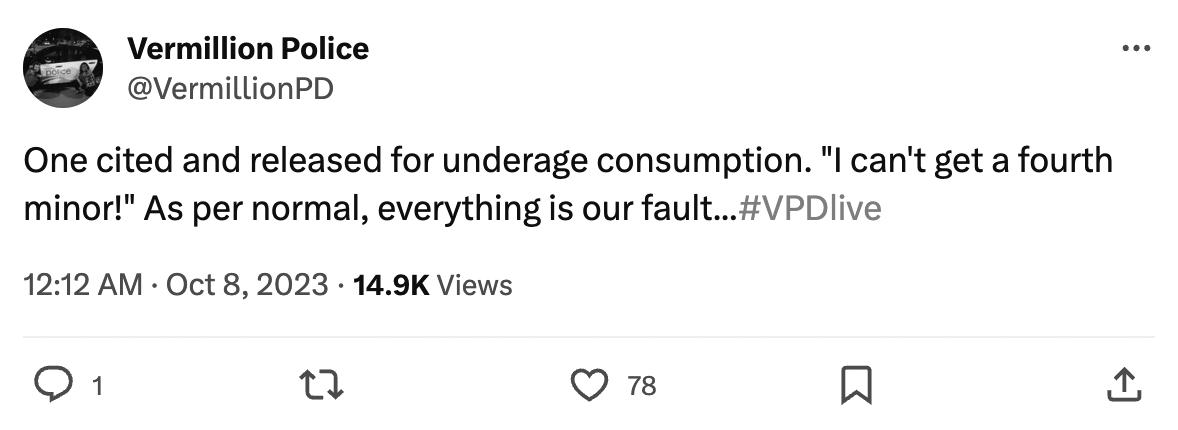
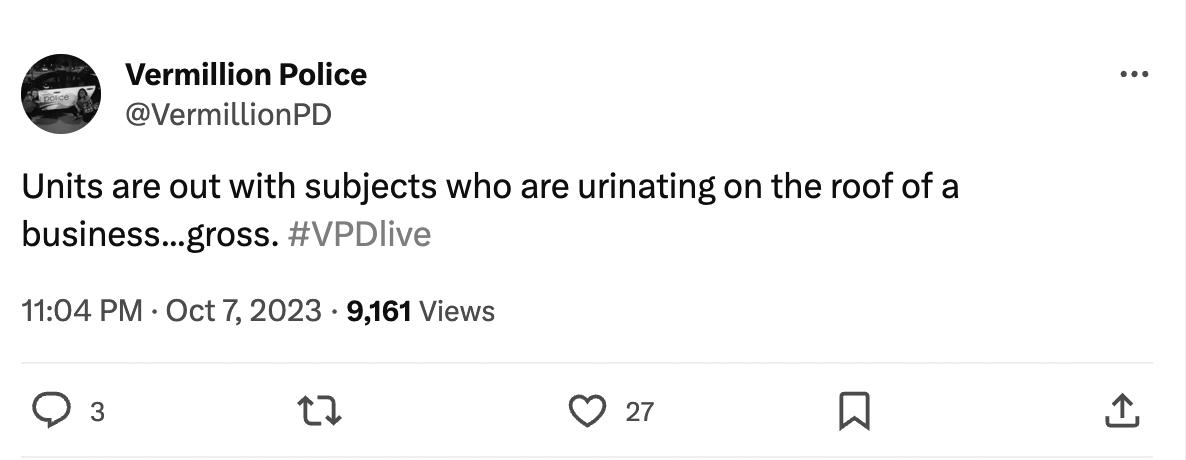
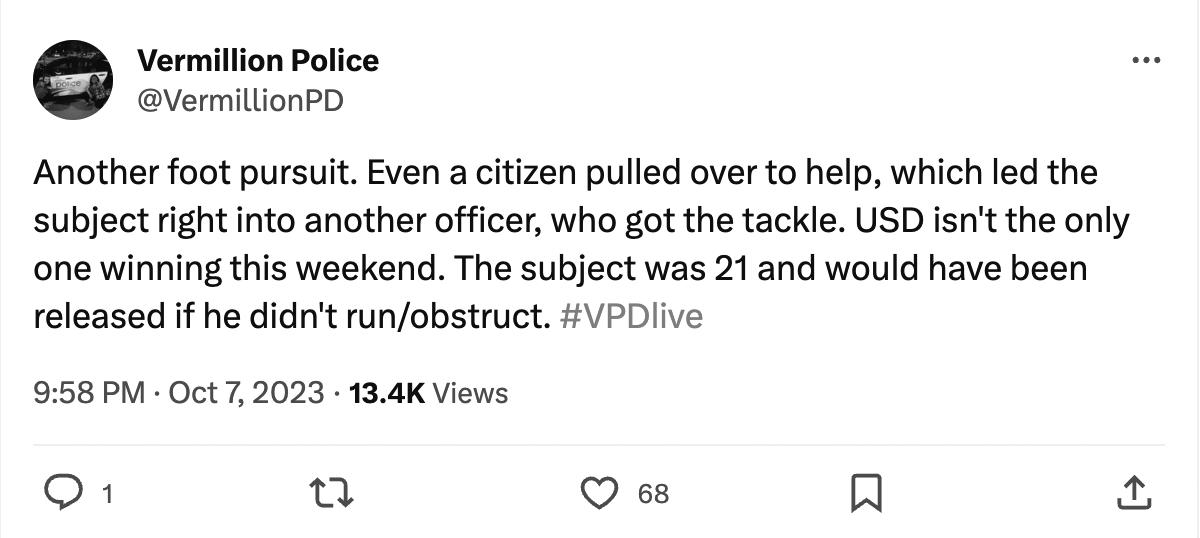
Five timely warnings have been sent out to USD students and faculty members regarding on-campus sexual assaults this academic year.
Timely warnings are alerts issued through the Everbridge emergency notification system. The university is required to warn students and staff when there is a crime reported on campus that warrants notification outlined by The Clery Act.
University Police Chief Bryant Jackson states that the Everbridge mobile app has multiple safety features available to keep students and faculty safe on campus.
“Through the Everbridge mobile app, faculty, staff and students have access to additional, enhanced safety features that help keep our community safe and informed during crisis situations, including an emergency call feature, SOS panic button and safe corridor check-in notifications,” Jackson said.
UPD’s main mission is to ensure a safe and secure environment for all students, staff and the university community.
UPD takes all campus criminal investigations seriously, which is why all crimes reported on campus are handled with the same urgency no matter the severity of the crime being investigated.
USD Director EEO and Title IX Coordinator Jean Merkle said that many of the incidents reported on campus are from some individuals close to the victims of an assault.
“Crimes regarding on-campus sexual assaults are typically reported through friends of the victim, an RA or other faculty members, most of whom work as mandatory reporters, Meaning that they are required to report any incidents they hear about
directly to their supervisors, UPD, Title IX or The Dean of Students,” Merkle said.
Merkle explained the decrease in time spent in between crimes taken place and crimes reported on campus.
“People are feeling comfortable to report sooner after the incident; previously, complainants come in a month later or even six months after an incident. Now, persons are coming forward 24 to 48 hours after an incident has occurred,” Merkle said. “This is good news as it helps improve evidence collection, as well as ensure medical attention.”
Once a crime is reported on campus, UPD can begin conducting an investigation or send out an initial response in one of many ways.
This includes a patrol officer meeting with the victim at their location or at the police department, emergency medical assistance will be provided if necessary, as well as the preservation of any evidence present and an interview with the victim or victims about their experience.
Investigative detectives may also respond using a traumainformed and victim-centered approach, which prevents victims from having to share their experience with multiple investigating officers multiple times. This is ideal in investigations regarding sexual assaults or other highly traumatic events.
These specific types of investigations may also include further collected evidence, a sexual assault forensic exam, interviews with witnesses and the identification of suspects.
Jackson said this process can be heavily dictated by the victims desire to pursue further investigation.
“It is important to note that the victim’s desire to move forward
or not to move forward with a criminal investigation plays a significant part in this process. A victim can elect not to move forward with a criminal investigation if they choose,” Jackson said.
Jackson emphasized the departments efforts to prevent students from on campus sexual assaults and stigmas surrounding reporting sexual assault related crimes.
“The university has worked diligently to remove barriers to reporting acts of sexual violence and interpersonal violence,” Jackson said. “According to the National Center for Education Statistics, sex offenses make up nearly 44% of all crimes reported on college campuses nationwide. We believe it is critical to create an environment where victims of crime feel safe coming forward.”
The university offers many different resources for students wishing become more aware of sexual assault prevention.
Through UPD, campus funded organizations such as ICARE, PAVE, RAINN and through the universities Title IX offices are just some of the ways that students can be informed about the topic.
Some of the resources available to students include bystander training, healthy masculinity training, advocacy programming, legal response training, medical assistance, domestic violence support, counseling, work, housing and safety accommodations.
For more questions or concerns regarding sexual assault prevention and awareness resources on USD’s campus please visit https://www. usd.edu/About/DepartmentsOffices-and-Resources/HumanResources/EOAA-Title-IX. For more information regarding UPD’s investigative process, questions, concerns, contact universitypolice@ usd.edu.
October 11, 2023 www.volanteonline.com
Al Neuharth Media Center 555 N. Dakota St. University of South Dakota Vermillion, SD 57069 Adviser
Janet Davison
Mission statement
The Volante covers issues relevant and interesting to USD students. Faculty, staff and community members are welcome readers, but the newspaper is written and presented for a diverse community of students from the students’ point of view. The paper should provide a variety of information, entertainment and educational opportunities for the readers. The Volante encourages everyone to write letters to the editor.
The Volante wishes to be viewed by students as respectable, objective, accurate, fair and trustworthy. If you have comments, concerns or questions, please contact The Volante at 6775494.
The Volante is distributed Wednesdays during the academic year free of charge locally with the cost of $1 for each additional copy. One year subscription rates are $40, which solely covers the mailing costs.
The Volante does not endorse, promote or encourage the purchase or sale of any production service advertised in this paper. Advertisements are the sole responsibility of the advertiser.
The Volante disclaims all liability for any damage suffered as the result of any advertisement in this newspaper. The Volante reserves the right to refuse any advertising.
Tavin CarncrossEditor-in-Chief
Jordan Grothe
Managing Editor
Jozie Kumm
News Editor
Juliana Oltmanns
Assistant News Editor
Sydney Kolln
Verve Editor
Trevan Rychlik
Sports Editor
Charles Streeter Opinion Editor
Sydney Johnson Head Designer
Madison Martinez
Photo Editor
Alexandra Streeter
Social Media Director
Ella Dellperdang
Advertising Manager
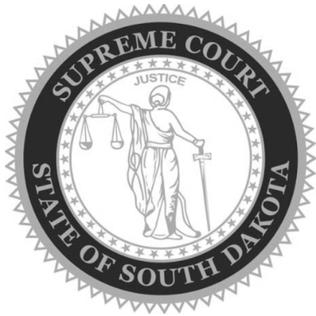 Juliana Oltmanns Juliana.Oltmanns@coyotes.usd.edu
Juliana Oltmanns Juliana.Oltmanns@coyotes.usd.edu
All five justices from The South Dakota Supreme Court participated in a series of oral debates presented by the USD Knudson School of Law. These cases took place on both Oct. 4 and Oct. 5 from 9:00 a.m. until 11:15 a.m. in the Knudson School of Law courtroom.
There were a total of nine cases presented in the form of oral arguments at these specific hearings with four cases taking place on each day the Justices were at USD.
Each case had a set aside ten minute break in between the case being appealed and the upcoming case.
Neil Fulton, the Dean of the Knudson School of Law, said the idea of the Supreme Court justices attending student created cases originally came about.
“The SD Supreme Court coming to the law school was a joint idea, in which the Chief Justice had mentioned a couple of years ago, that they would be interested in participating in cases held at the law school while doing a panel one Wednesday afternoon,” Fulton said. “In which I moderate a panel where the Supreme Court talks about their work, and then later we have a reception with the state bar that is focused on rural practice initiatives.”
The tradition of inviting The South Dakota
Supreme Court to sit in on student presented hearings is one that the Knudson School of Law plans to continue for many years to come.
Fulton said hosting these cases poses a rare
as to practice their debating skills.
“The Supreme Court is generally coming to USD every year now; they used to come every other year, but that has now changed and they are here every year which is great,” Fulton said.
Fulton went into further detail about the importance of unique opportunities such as the Supreme Court’s attendance at these hearings because it allows students an insight into their own futures.
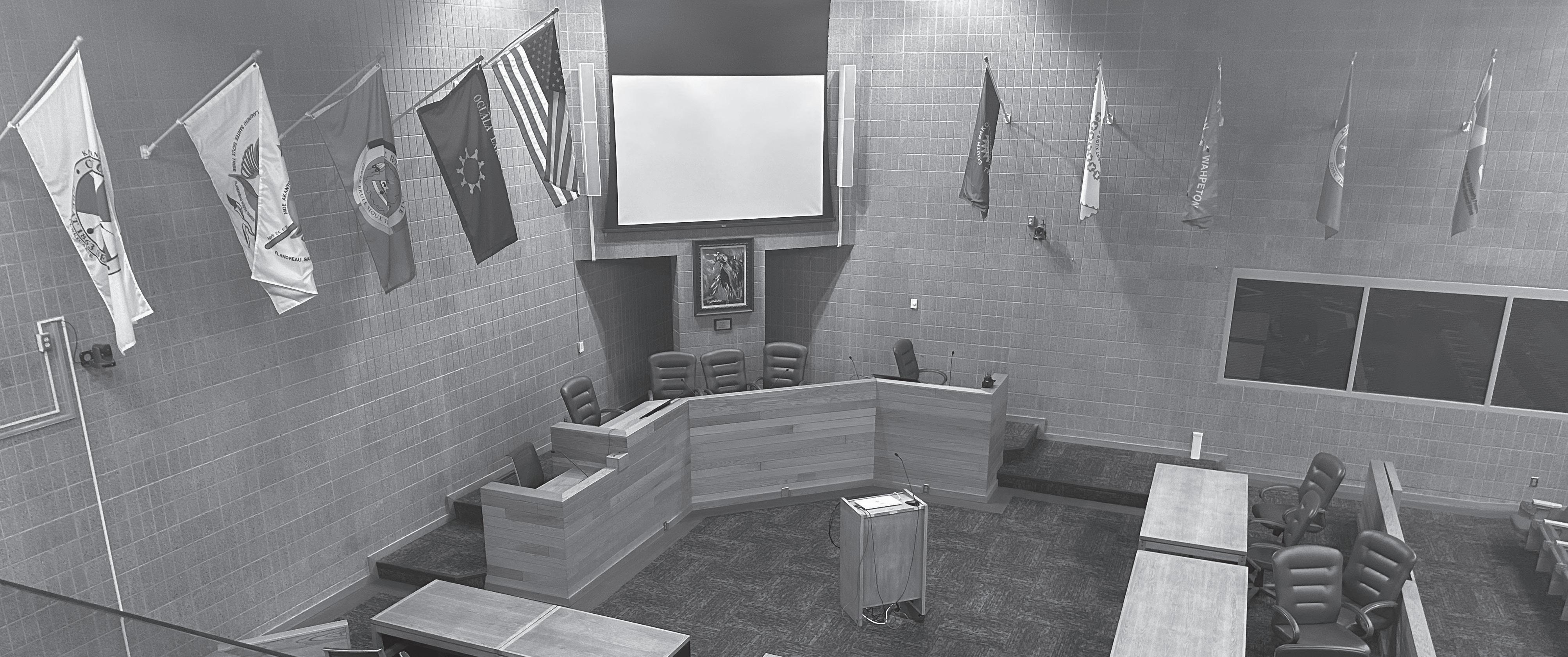
“It’s important for students to see handson lawyering, as it’s incredibly valuable to their education,” Fulton said. “It is tremendous for them to actually be able to hear from the perspectives of judges themselves, and to learn about what their work is like, as well as to process how they got to their positions, as these things are inspirational.”
Fulton said he is optimistic and excited about these debates whenever they take place.
“I tell people all the time when it comes to this time of the semester, that it’s kind of a law school Christmas to me because it’s really fun getting to see all the students in professional dress.” Fulton said.
educational opportunity for USD law students to further learn about their future legal careers as well
Fulton said that he also encourages younger students to go to these events to show that they could be in those same shoes.
“The first year and second year students who
Josh Davis, the Coyotes’ new offensive coordinator who came over from the reigning champion South Dakota State Jackrabbits, has made a huge impact in a short amount of time.
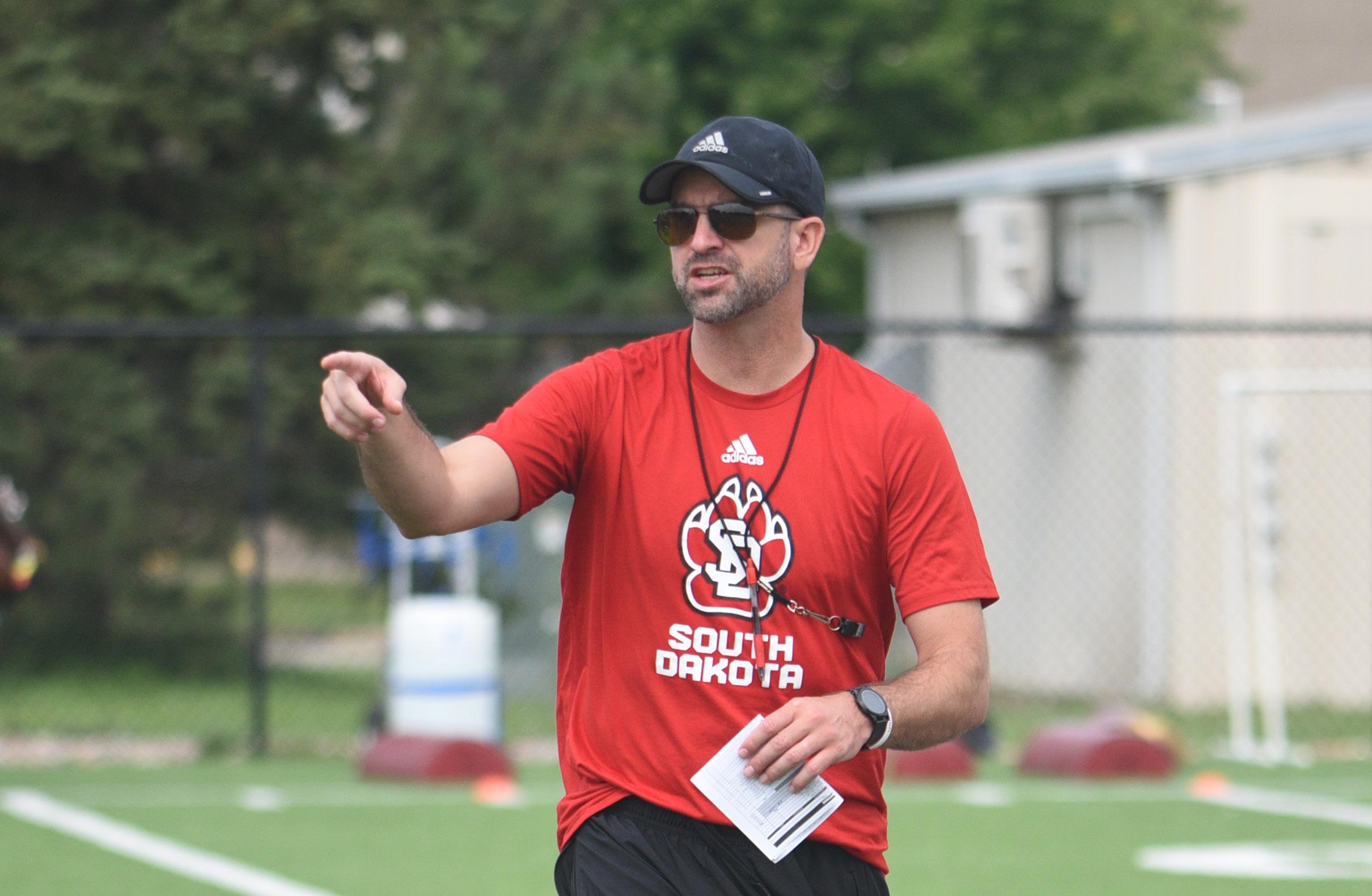
Last year, the Coyotes’ offense averaged 16.2 points per game and 286.1 yards per game with an average of five yards per play. The Coyotes averaged 122.8 rushing yards per game and had 23 touchdowns on offense in 11 games.
Under Davis, the Coyotes are averaging 26.2 (51) points per game and 326.2 (76) yards per game with an average of six (28) yards per play (FCS ranking). The Coyotes are averaging 164.2 rush yards per game. The Coyotes have 17 touchdowns on offense in 5 games this season with 100% red zone efficiency.
Davis spent one season with the Jackrabbits as the wide receiver coach and passing game coordinator where he helped tight end Tucker Kraft to an All-Conference First Team and was drafted 78 overall to the Green Bay Packers. Second Team All Conference also featured quarterback Mark Gronowski, tight end Zach Heins and wide receiver Jaxon Janke.
He also helped Gronowski to the Most Outstanding Player in the FCS Championship game last year as he went 14 of 21 passing with 233 yards and three touchdowns. He also added 58 rushing yards and a touchdown.
Davis used his time on the Jackrabbits to learn everything he could and bring it over to the Coyotes where he continues to build trust and belief.
“More time together, more trust, more love and more belief,” Davis said.
The Coyotes season did not start off very strong though as they lost to Missouri 35-10. From there, Davis knew there was a lot to learn and grow from then till now.
“A lot of growth. Growth in me, our staff, our game plan and in the performance of our students athletes,” Davis said.
The Coyotes are currently 4-1 on the season after a Dakota Days victory (38-7) over the Murray St. Rac-
ers. This win was also coming off a massive upset victory over at the time No. 2 North Dakota State Bison the week before.
With the two victories, the Coyotes are ranked No. 10 in the FCS Stats Performer Poll for the first time since 2017 and No. 17 in the FCS Coaches Poll. Davis said that the Coyotes must have a championship state of mind if they want to continue the success this season.
“We need to attack everyday with a championship state of mind,” Davis said.
A championship state of mind starts with the coaches and the staff but also the leaders and the captains of the team. One of those captains is junior running back Travis Theis, the Coyotes leading rusher.
Theis said he loves the new change with Davis at the helm and looks up to his new offensive coordinator. He also has a whole new understanding of the
offense with his new mentor.
“Better understanding of how the play works and what people’s jobs are and why the play should work,” Theis said.
Davis said that this understanding leads to everyone on the field knowing what they are expected to do during the game.
“Take care of the football, run the football effectively with zero turnovers and minimize negative yards,” Davis said.
With Davis being a first time coordinator at the Division-I level, he knows he has more to learn and get better.
“Everybody gets better in their own way,” Davis said.
Davis said it is not just the offense, defense or the staff but it is everyone combined together.
“Coyote football is a we team,” Davis said.
Brock Mogensen, a senior linebacker and captain of the Coyotes football team, has been named one of the 39 semifinalists for the Campbell Trophy.
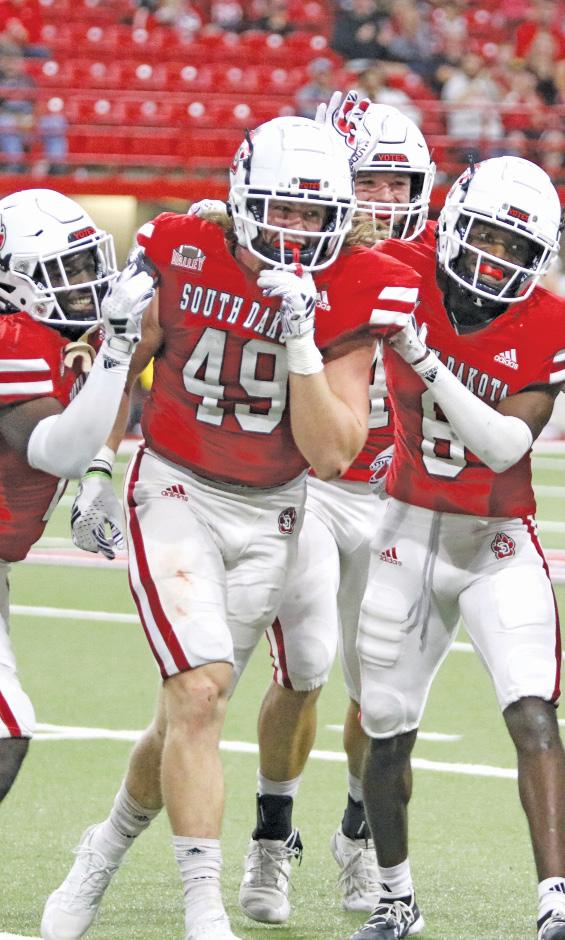
The Campbell Trophy is awarded for individuals who excel in leadership and academic success. Semifinalists for the award must have a GPA of at least a 3.2, have outstanding football ability and have demonstrated strong leadership and citizenship.
Other Coyotes to be nominated for this award are Chris Streveler (2017), Isaac Armstead (2018) and Jack Coachrane (2020 and 2021)
Mogensen has been with the Coyotes for five seasons and in each of those seasons, he has made the Missouri Valley Football Conference (MVFC) honor roll. He has also won both the MVFC President’s Council Academic Award Winner and the MVFC Commissioner’s Academic Excellence Award.
Mogensen started his football career when he was six years old. He has been involved in football throughout elementary, middle, high school and now college.
Mogensen said he wouldn’t have been nominated for the award without his team around him.
“It just shows us to work hard for everyones who’s gotten nominated and everyone on our team. We’re all focused on school and football,” Mogensen said.
A piece of advice Mogensen relies on for his success is working hard and playing with passion.
“No matter what you’re doing, work as hard as you can in school, sports or whatever. That’s a big, big thing for your future,” Mogensen said.
Mogensen shows his hard work and passion on the field as he leads the Coyotes defense with 40 tackles and an interception as well as having two quarterback hits. Mogensen leads the Coyotes which is the second best scoring defense in the FCS.
Mogensen is thankful for his family for supporting him throughout his football career and was his inspiration to keep playing.
“I grew up a sports fan,” Mogensen said. “My dad was a football coach. My mom played basketball in college. All my siblings were athletes too. So, my parents were my biggest inspiration.”
The National Football Foundation will cut the 39 semifinalists down to 14 finalists on Oct. 25. There, those 14 will receive a postgraduate scholarship of $18,000.
They will then get to travel to Las Vegas on Dec. 5 to the 65th Annual Awards Dinner where the winner will be announced.
The Coyotes swim and dive teams began their season this month on Oct. 6 in Mankato, Minnesota. The Coyotes defeated Minnesota State University 192-108 in a women only meet.
The Coyotes dive team was led by senior diver Stella Fairbanks as she finished in fourth place in the women’s 3 meter dive with a score of 224.05 against Minnesota State.
Earlier this season, Fairbanks was nominated to the Summit League preseason watchlist. Fairbanks is one of four Coyotes to make this list, along with graduate Zach Kopp, freshman Charlie Matthews and junior Emily Kahn.
Fairbanks said the nomination is an honor for her with the amount of talent in the Summit League.
“For me, it’s an honor to be part of that list because there are a lot of good divers within our conference and other teams,” Fairbanks said. “I just think that it’s an awesome accomplishment to have.”
Fairbanks said she has a lot of optimism for the remainder of the season. As she described the expectations for
the entire dive team this season, Fairbanks used one word: “Greatness”.
“We’re gonna try our best and we’re gonna give other teams a fight,” Fairbanks said. “We’ve come a long way and I know that it’s been kind of a challenge. I think that we really learned to adapt and to roll with the punches, and I think it’s going to be a good year for us.”
Fairbanks said the dive team at USD is truly a family and they make the atmosphere great.
“We are like a family, and teams like that are few and far between, so it’s a really awesome atmosphere to be able to do a sport that you love and to be with people that you love too,” Fairbanks said.
Fairbanks said this will be her last season and wants to get everything she can out of it.
“I’m really just trying to take it all in because it is my senior year,” Fairbanks said. “I just want to really enjoy diving and being part of a team because this will be the last time that I’ll be in a sport.”
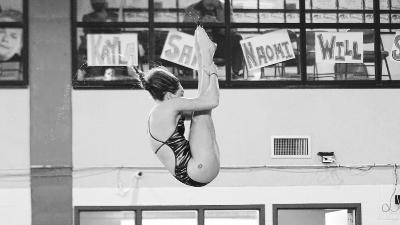
The Coyotes and Fairbanks season continues on Oct. 14 with a meet against Minnesota in Minneapolis.
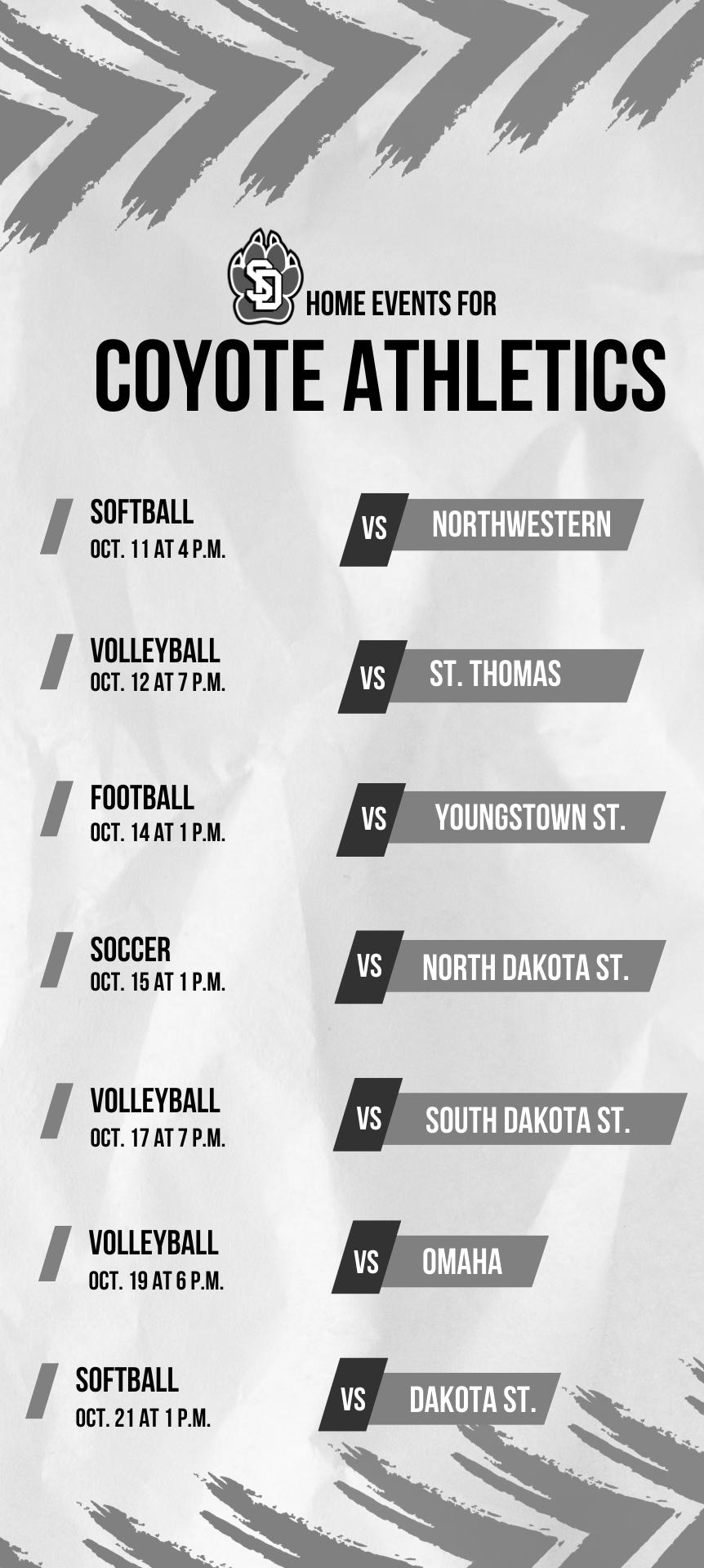
Relying solely on AI for writing comes with a set of limitations and concerns that should give pause to those considering it as a replacement for human creativity and intellect.
While AI has made significant advancements in generating text, there are compelling reasons why people shouldn’t wholly depend on it for content creation.
One of the most glaring limitations of AI-generated content is its lack of true creativity. AI operates on algorithms and patterns learned from existing data, but it doesn’t possess the capacity for imaginative thinking or the ability to produce truly unique and innovative ideas. Writing often demands a creative touch, an element that AI struggles to replicate convincingly.
Moreover, AI lacks the emotional understanding that humans possess. It cannot grasp the depth of human emotions or context in the way people can. It doesn’t have empathy or the ability
to understand the nuances of human sentiment. This makes AI ill-suited for producing content that requires an emotionally resonant or empathetic touch.
Ethical concerns also loom large when relying on AI for writing. AI-generated content can inadvertently promote
detrimental impact on human writing skills. When people rely heavily on AI as a crutch, they risk becoming less adept at expressing themselves, crafting engaging narratives or conveying complex ideas. The result is a potential erosion of the skills that make effective communicators.
”
plagiarism, misinformation, or biased narratives because it lacks the innate ability to discern the ethical implications of its output.
Without human oversight, it may perpetuate unethical practices that damage trust and credibility.
Overdependence on AI can have a
EDITORIAL BOARD
THE STUDENTS’ VOICE SINCE 1887
Even though AI promises efficiency gains, it often requires significant human intervention for quality control. Editing and oversight are necessary to ensure accuracy and coherence in AI-generated content. This mitigates some of the efficiency benefits AI proponents tout.
Furthermore, the widespread use of AI for writing can lead to job displacement in the writing and editing industries.
Professional writers and editors may face a shrinking job market as AI takes over content creation tasks.
In marketing, where creativity and originality are paramount, AI-generated content can struggle to capture the uniqueness and brand voice that makes marketing materials effective. It often lacks the ability to connect with consumers on a personal and emotional level.
AI-generated content also poses security risks. It can be exploited for malicious purposes, including the spread of fake news, spam, or phishing attempts. AI lacks the ability to evaluate the ethical implications of the content it generates. Everything written until this point was written by ChatGPT. Even though the software helps many with different activities, it can still hinder one’s ability to write.
Here you’ll find the weirdest, funniest and stupidest things we’ve heard during the week. Context is for suckers.
“It’s starting to smell like crayons.”
— Main St.
“I’m being deadass. I cannot see you.”
The Volante welcomes letters to the editor in regards to campus, local, state and national issues. Letters will be edited for clarity and length and will be printed as space allows. Please limit letters to 300 words or fewer. The Volante reserves the right to hold letters for publication in a later issue.
Submissions must include the author’s name, address, telephone number, year in school and major or job title. Letters must be exclusively for The Volante. We will not publish anonymous letters.
Send letters to:
Al Neuharth Media Center
555 N. Dakota St. Vermillion, S.D. 57069
Fax to: 605.677.5105
Email to: volante@coyotes. usd.edu
Via our website:
The deadline for letters is 5 p.m. the Friday prior to publication. Letters must be typed and fewer than 300 words.
— Prospect St.
“It’s not my actual kid. It’s just a squishmallow.”
— Main St.
“Please never exist around me again.”
— Coyote Village
WEDNESDAY, OCTOBER 11, 2023 THE VOLANTE VOLANTEONLINE.COM/OPINION
When peopple rely heavily on AI as a crutch, they risk becoming less adept at expressing themselves, crafting engaging narratives or conveying complex ideas.
Should we as students expect more from campus dining based on what we are paying for?
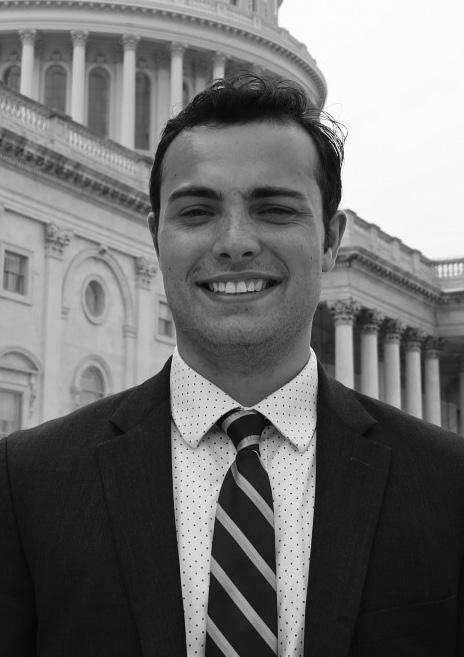
A common grievance among many students is about the quality of meals on campus, in particular the residential dining cafeteria. Sodexo contracts as the catering company that serves all South Dakota public colleges, a decision made by the South Dakota Board of Regents.
Oftentimes, the lines in the cafeteria wind all the way to the register during the noon lunch break. Students may wait up to 15 minutes to get their food.
Though the cafeteria had a facelift this summer with some new renovations, it did not seem to improve efficiency.
There’s also the problem of
food running out before dining hours are over.
For example, sometimes students swipe into the cafeteria 30 minutes before they finish serving breakfast, and most of the food stations are either empty or have already been replaced with lunch options. This makes it difficult for students with full schedules to find times to be able to eat in between classes.
The Everyday app is also an issue. Oftentimes the menu items listed in the app do not match what is actually being served in the cafeteria.
The app itself occasionally has bugs and sometimes does not show all the menu options for the upcoming week. However, these bugs are not a shortcoming
on the part of Sodexo itself, rather, they are the fault of the app’s developer, Dynamify Limited.
It’s alarming to look at some of the nutritional facts of the food we are offered. According to nutritional facts available on the Everyday app, if you eat foods such as the California BLT Wrap from the bistro grill, you could be consuming 90% of your daily saturated fat intake and 56% of your daily sodium intake in a single serving.
However, some of the nutritional value of the food we choose is really up to us - there are options such as the salad bar.
Most frustrating is the cost. With the default meal plan, Yote Pack 70, students are paying $1,999 for $1,109 flex dollars and

70 meal swipes.
That amounts to around $12.71 per meal swipe, which is higher than the average cost of a meal at one of the restaurant-style dining options on campus.
All of these problems could be addressed through a few different options. First, students should decide if they want to pay for a meal plan.
Second, USD should be in charge of choosing its own catering company. There is no incentive to improve campus dining if every student living on campus is forced to buy a meal plan, with food served by a company with a contract in effect through 2027.
Ultimately, we deserve consistent and quality food every time we eat on campus.
Have you ever thought about why you exist? I know I have.
I try to ask myself that question on a fairly regular basis.
There was a time in each of our lives when we gained self-awareness, around the age of four.
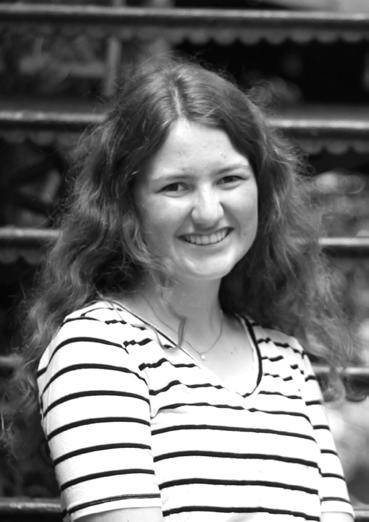
Clearly, we all know we exist. I don’t want to kickstart someone’s existential crisis in writing this, but it’s important that we at least entertain the idea that we have some purpose.
I’m not trying to push people toward a particular religion or faith, but I would like to steer people away from something that has plagued our society for decades (or even centuries):

mediocrity.
Society tolerates mediocrity too much. In my view, that stems directly from an avoidance of discomfort. Everyone is guilty of this, especially myself, but this seems to be more prevalent in our society than ever before.
I find it terrifying that I could live my entire life not doing as much as I could do. I don’t want to sit and think about everything that I didn’t accomplish and now I couldn’t. Even scarier is the idea that I would be okay with mediocrity.
I’m not saying that some people are failures, far from it. It’s easy to get bogged down in
day-to-day life. Making things better, even in our personal lives, can be extremely difficult.
If we’re going to make things better, we need something that we can aim at. This is partially why religions exist. They provide some goal at the top of the pyramid that we can aim for and miss, but perhaps preferable to aiming in the dirt. I’ll let you decide what goal you want to aim at.
It’s not about falling down, but rather about getting back up. Perhaps in pondering why we exist, we can be reminded of the ways that we can get back up.
For example, a goal of daily
exercise seems reasonable. Most of us will inevitably miss a day of exercise, but that’s much better than never exercising. Even going from exercising zero times a week to two times a week is infinitely more amount of weekly exercise.
A lot of us have grand plans and ambitions once we get out of here. However, none of us will change the world if we can’t change ourselves.
Sometimes I struggle to answer the question of why I exist and why I’m at USD, but I’m much closer to an answer when I keep it in the back of my mind.
The Clay County Historical Society held their sixth annual Spoken History Cemetery Tour on Oct. 9. The theme for this year was “Getting Down to Business.”
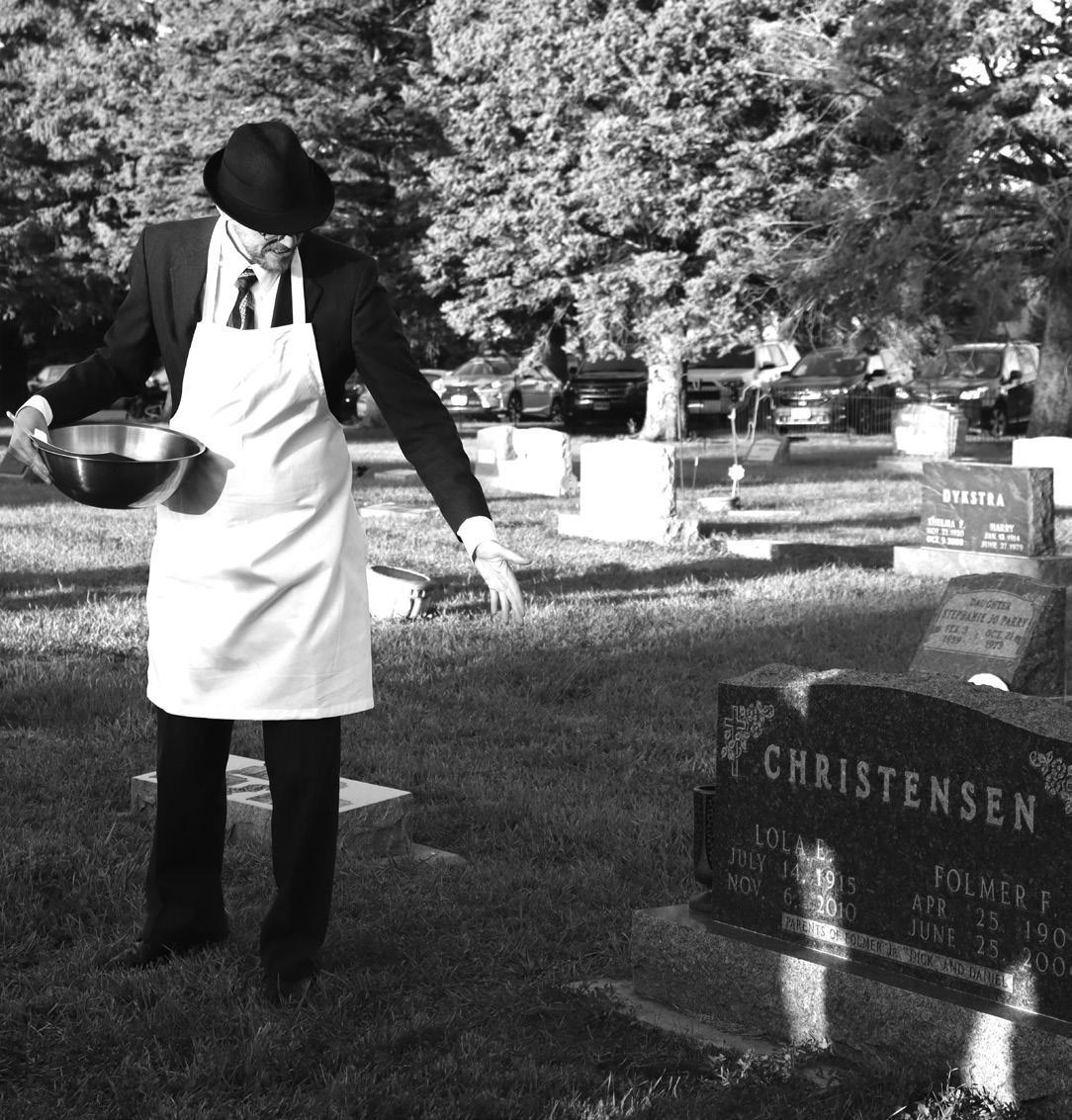
Joni Freidel, who is the chairperson for the event, has been working for the Spoken History Cemetery Tour since it first started.
“It actually started years ago,” Freidel said. “We just knew that there was a lot of history in Clay County. It was a great way to promote not only the mission of the Historical Society, but also to spike interest and tell people’s stories.”
Each year, five people that are buried in the Bluff View Cemetery are chosen by a committee to have their stories shared with the community.
“There is a committee, and each one of us takes a person,” Freidel said. “We research that person, so we look at obituaries and documents. I spent some time on ancestary.com to make sure that we have family connections correct. People hunt to put together the life story of the people that we are portraying.”
One of the people selected this year was Fol-
mer F. Christensen. He worked as a baker in Jacobson’s Bakery in 1929. Royce Miller, a firsttime volunteer, took on the role of Folmer and shared his life story.
“(Folmer F. Christensen) was a very solid and down-to-Earth character that ran a bakery for 40 years and ran it well,” Miller said. “I think it’s interesting to know stories, and the more that we connect to each other, it’s always better.”
The Clay County Historical Society was established to promote and preserve the history of Clay County. With the Spoken History Tour, they can make sure that history isn’t lost.
“I heard this quote that “The first time you die is when they bury you, and the last time you die is when nobody ever says your name again,” Freidel said. “I take that to heart a little bit. I really love the fact that these people are still alive in the heart’s of our community.”
For more information about the Clay County Historical Society and their future events, check out their Facebook page at https://www.facebook. com/claysdhistory/.
The ribbon cutting ceremony for Pied Piper Flower and Gifts occurred this past Friday, Oct. 6. The shop has been in Yankton for a few years and has now expanded to Vermillion.
Pied Piper is owned by Becky and Jody Frye who purchased the business in Aug. 2018. Vermillion is their third location, after Hometown Floral and Gifts in Tyndall, SD, and Pied Piper in Yankton.
“We owned the store in Yankton, and we had a lot of Vermillion people coming over and saying we needed to open a location here because the town was lacking,” Becky Frye said.
Manyl customers packed the shop on Oct. 6 to celebrate and check out the new business.
“We’ve had customers from Vermillion traveling to Yankton and we’ve delivered to Vermillion for many years,” Jody Frye said. “What changed it for us was when customers said “Why don’t you just have a store in Vermillion?””
The store was originally opened by Jim and Kathleen Piper. The name Pied Piper came from them over 40 years ago. The establishment’s history is why the Fryes decided to keep the name.
“We just looked for something we would enjoy. So when we saw it for sale, we decided it would be a good fit,” Becky Frye said.
The business carries fresh flowers, plants and a wide variety of gifts. They also do custom designs and delivery.
“We specialize in weddings and funeral work, but we do everything,” Becky Frye said.
According to the Fryes, the city of Vermillion has been very welcoming to the shop, and it is hopeful to see growth. The Vermillion Chamber has been instrumental in getting the business going.
“We’ve had wonderful contractors and wonderful leaseholders, no struggles,” Becky Frye said. “It was pretty seamless.”
Over the years, Jody Frye said that she didn’t expect the business to grow as much as it has but she enjoyed it this far.
“We didn’t expect it to grow as it has but we’re enjoying it,” Jody Frye said. “We just enjoy the customers, the community and all the places we go to meet people. We just love what we are doing now. It kind of just keeps us going.”
Sydney Kolln | The Volante Royce Miller, a first-time volunteer at the Spoken History Cemetery Tour, took on the role of Folmer F. Christensen a baker in 1929 who died in 2000.